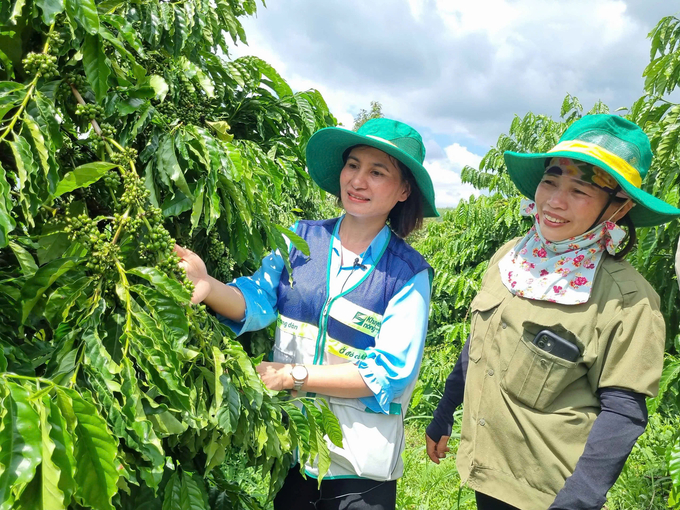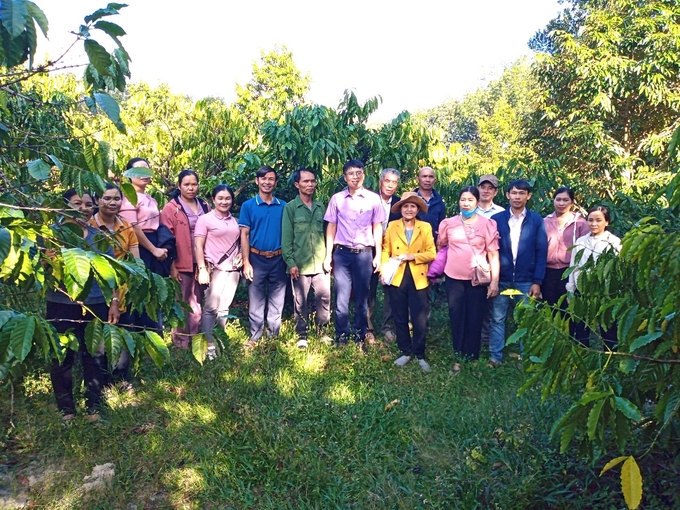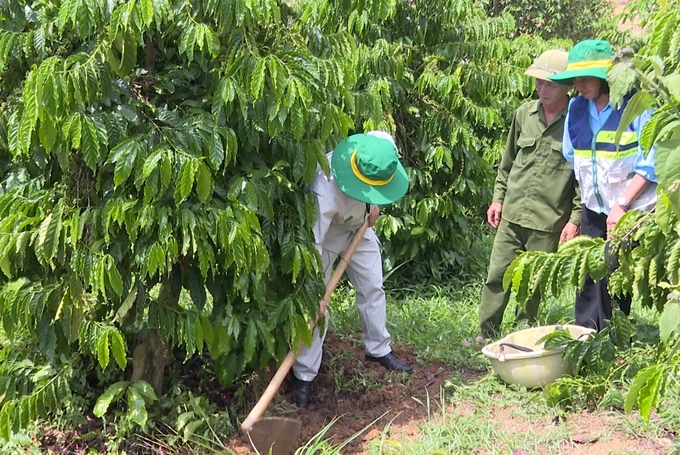June 21, 2025 | 17:17 GMT +7
June 21, 2025 | 17:17 GMT +7
Hotline: 0913.378.918
June 21, 2025 | 17:17 GMT +7
Hotline: 0913.378.918

Ha Mon commune's agricultural extension team guides people in pruning coffee branches. Photo: Tuan Anh.
The community agricultural extension team in Ha Mon commune (Dak Ha district) is one of two provincial-level teams in Kon Tum that are responsible for assisting and advising individuals in the sustainable cultivation and maintenance of coffee.
Mr. Doi Van Cuong, the leader of the Ha Mon commune community agricultural extension team, conducted their customary stroll through the coffee plantations in the "coffee capital" of Dak Ha district in early July. Mr. Cuong and his team members were rendered even more proud by the sight of the verdant coffee plantations in the blazing sun. After nearly two years of operation, Mr. Cuong's community agricultural extension team has begun to achieve "sweet outcomes," as numerous households in the region have become acquainted with the sustainable coffee cultivation model.
The most significant accomplishment of the community agricultural extension team, according to Mr. Doi Van Cuong, has been the establishment of a partnership with Binh Dien Fertilizer Joint Stock Company to implement wise coffee cultivation in the districts of Dak Ha and Dak To.
Furthermore, the community agricultural extension team has provided Vinh Hiep Co., Ltd. with assistance in the expansion of nearly 600 hectares of 4C coffee for 460 households in Kon Tum province in 2023. This support will be maintained in 2024. Additionally, the community agricultural extension team has facilitated the signature of a cooperation agreement between Vinh Hiep Co., Ltd. and 840 farming households in Kon Tum province for the production and consumption of 4C coffee.

Mr. Cuong is instructing Mr. Thu's family on how to fertilize effectively. Photo: Tuan Anh.
“The primary objective of the community agricultural extension team is to facilitate the transfer of technology to enterprises and units, as well as to conduct training sessions for farmers in the region. In 2022, we conducted 22 training sessions for 840 agricultural households, with the primary objective of providing them with guidance on the cultivation of 4C standard coffee, the establishment of a linkage chain, and the consumption of the products” Mr. Cuong disclosed this information."
Mr. Pham Van Thu's family (Binh Minh hamlet, Ha Mon commune, Dak Ha district) has received substantial support from the community agricultural extension team, having grown coffee in an area of more than 1.5 hectares. The community agricultural extension team provided Mr. Thu's family with over 2 tons of Binh Dien fertilizer, particularly in 2024. Concurrently, the team offered advice on branch management, pruning, and care techniques to guarantee optimal tree development and superior produce yield and quality.
Mr. Thu reported that his family's coffee garden has flourished and yielded larger crops due to receiving fertilizer support and implementing the techniques recommended by the agricultural extension team. Without natural disasters, the forthcoming harvest is anticipated to be fruitful, with a yield increase of approximately 20%.
In the same vein, the community agricultural extension team, in partnership with the Binh Dien Fertilizer Joint Stock Company, assisted Mr. Nguyen Van Hung's family (hamlet 4, Dien Binh commune, Dak To district) in the cultivation of one hectare of pure coffee. The community agricultural extension team efficiently maintained and fertilized the coffee garden.
Mr. Nguyen Tri Sau, Director of Sau Nhung Agricultural Production and Trading Cooperative (Dak Ha district), emphasized the importance of establishing community agricultural extension teams to provide assistance to individuals, cooperatives, and businesses. These teams are responsible for the coordination of product consumption in a specific direction, in addition to their involvement in cultivation and care techniques. By adhering to the methods of the community agricultural extension teams, the production of agricultural commodities, particularly coffee, is expected to increase by approximately 40%, and potentially even more. For producers, this implies an increase in surplus value.

Community agricultural extension group organizes training on sustainable coffee production techniques in Dak Ha district. Photo: Tuan Anh.
Mr. Sau also noted that the community agricultural extension teams' activities have not yet fulfilled the current agricultural sector's requirements, despite their effectiveness. The coffee area that is a result of the teams' activities is still quite modest. The operational methods of the teams must be more specific and proactive. The personnel involved must be genuinely committed to providing practical, not theoretical, instructions to farmers, guiding them over the long term rather than just seasonally, and not solely through field workshops.
The agricultural extension system at all levels has been streamlined by the community agricultural extension teams, as noted by Ms. Y Hang, Deputy Director of the Kon Tum Provincial Department of Agriculture and Rural Development. These teams have been established to address practical requirements, facilitating the connection between businesses, cooperatives, and individuals involved in the production and consumption of agricultural products, particularly coffee.

Community agricultural extension is promoting its role in supporting people in coffee-producing areas. Photo: Tuan Anh.
In recent years, the community agricultural extension teams have played a substantial role at the grassroots level by engaging in the communication of the Party and State's policies on agricultural and rural development. Additionally, they advocate for the dissemination of scientific and technological innovations in agricultural production, which enhances the quality of products and enhances economic efficiency. Additionally, they advocate for the establishment of coffee production chains in the province to enhance efficiency and quality.
Additionally, the community agricultural extension teams provide support to cooperatives and cooperative organizations in the construction of new rural areas, resulting in a significant increase in agricultural production for farmers. This integration of numerous values is instrumental in the sustainable production of coffee in Kon Tum province, which in turn facilitates the successful development of new rural areas.
The Kon Tum Provincial Department of Agriculture and Rural Development reported that the province had 73 community agricultural extension teams with 614 members by the end of June 2024. Two of these teams are provincial in nature, while 71 are commune-level. In the past two years, these community agricultural extension teams have implemented a variety of agricultural extension activities, including communication, guidance for farmers in agricultural production, and support for connecting businesses with farmers to establish production linkages. As a result, the agricultural sector has been enhanced in value.
Translated by Linh Linh

(VAN) The waste of resources from agricultural by-products and the situation of counterfeit and poor quality goods in production causing losses of thousands of billions were pointed out by the National Assembly deputy.

(VAN) After 5 years of implementation, the CAI initiative has helped coffee growers change their farming practices, moving toward responsible agriculture that meets global export standards.

(VAN) The primary prerequisite for the comprehensive and robust integration of Vietnam's livestock sector into the global value chain is the establishment of a disease control system.

(VAN) The results of national programs are essential for establishing a contemporary livestock sector that is well-equipped to meet the demands of both domestic and international markets, with robust biosafety standards.

(VAN) The UNESCO Global Geopark revalidation of Non nuoc Cao Bang and the transition to a two-tier administrative model are presently undergoing a pivotal moment in Cao Bang, the northernmost province of Vietnam.
/2025/06/13/5330-2-004539_953.jpg)
(VAN) Changing policy mindset and removing investment barriers are urgent requirements to open up new development space for enterprises in the agricultural sector.

(VAN) The areas include the restoration of five million hectares of marine ecosystems.